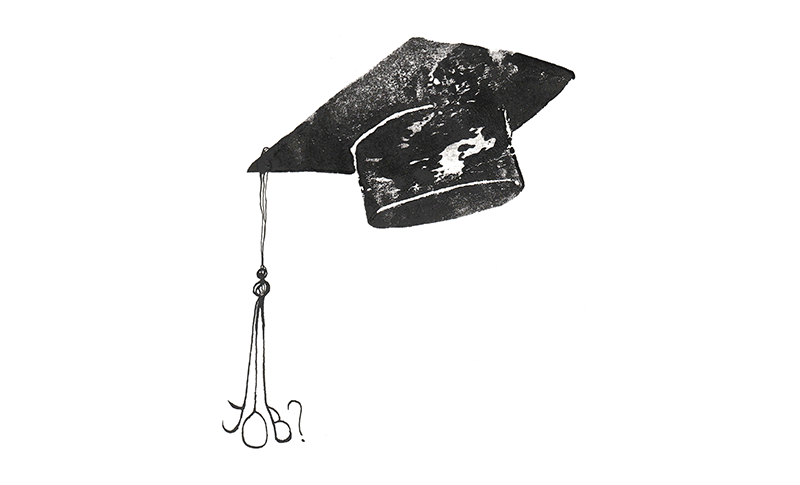It’s a big step from student life to working life, so a bit of preparation can’t hurt. How do you go about it? Five tips from experts and people who’ve been through it.
Tip 1: Know yourself
There’s plenty you can ask yourself about your future career. What issue or theme do you want to work with? Would you prefer to work in your home country or abroad? For a start-up or a multinational, the government or an NGO? Or in academia?
Maybe you already know which way you want to go, thanks to some of your courses or internships, or your thesis. But many students have doubts about whether they even want to work in their field of study. Head of Student Career Services (SCS) Astrid van Noordenburg has good news for these students: you can still go different ways with your career. ‘For many employers nowadays, it is not super important what someone has studied. They are more interested in your potential and motivation than in the right degree subject.’
She advises students who are not yet sure which direction they want to go to in come to the Career Day on Tuesday 7 February. ‘There you can meet some 60 companies in a low-stakes way. Go along and see what energizes you.’
Tip 2: List your skills
Do you feel that other students are doing more than you? You are not the only one, says student career coach Elizabeth Oenema. ‘Many students have a side job, do voluntary work or are on a committee. But when they compare themselves to others, they still get the feeling it’s not enough.
For me, a coach was a good investment
As a coach, I try to show them what they do well.’ Oenema’s tip: take a good look: analyse what experiences and skills you have. Where do your strengths lie, what are your weaknesses and in what areas do you want to grow? Melina (25) completed her Master’s in Plant Sciences in the summer of 2022 and had a session with a career coach to identify her skills. ‘It’s useful for people who don’t yet have experience in the field they want to work in. It helps you figure out what skills you have and how to communicate them well to potential employers.’
Tip 3: Talk to your network
When Indonesian-born Aika Foppen graduated from Wageningen in 2015, it wasn’t easy to find a job. Her own ‘bumpy start’ motivated her to help others on their way: she became a career coach. Some 30 per cent of her clients are WUR students. ‘My approach depends on how qualified someone is, where they come from and what field they want to work in,’ she says. For example, she is more likely to help Dutch students with salary negotiations and international students with knowledge about the Dutch labour market, communication skills and expectation management.
Foppen’s tip: networking. Taking part in social activities and joining associations inside and outside WUR is a good start, but you can make it more focussed than that. ‘Find people a bit older than you who are in the kind of post you aspire to and ask how they got there.’
Van Noordenburg also has a networking tip for students who already know what they want: ‘Express it. The more people you tell, the better. Then if someone in your network hears about something in that area, they are more likely to come to you.’
Tip 4: Make use of the help on offer
Could you use some help with your career orientation? WUR’s Student Career Services offers a range of free workshops, training courses and coaching. And they run a Career Day twice a year at which you can do things like having a free professional LinkedIn photo taken, or getting help looking for suitable vacancies. Melina (from tip 2) will soon be getting a CV check done at Career Services. ‘To check together whether my CV is tailored to the vacancies I want to respond to.
For many employers these days, it is not super important what someone has studied
You can do this by repeating words from the vacancy in your CV, for example.’ Van Noordenburg also advises international students who want to work in the Netherlands to take the Social Dutch course. ‘And mention that in your CV. Some Dutch employers are keen on you speaking the language.’
Career coaches (like Foppen, mentioned above) can be found outside WUR too, but they don’t work for nothing, of course. Tom from Indonesia recently graduated in Organic Agriculture and engaged such an external coach. ‘The SCS helped me with tips for events and CV checks, but I needed more personal guidance.’ After several months of searching, he found a job of the kind he wanted with the help of his coach. ‘For me, it was a good investment.’
Tip 5: Start early
Second-year Master’s students are the main users of SCS services, Van Noordenburg says. That makes sense: the closer you get to graduating, the more you think about finding a job. But it can be smart to start earlier, Melina thinks. ‘I missed out on some events ‑ such as lunches with potential employers ‑ because I signed up too late. Although you get to use SCS’s services for some time after graduating*, I would have liked to get my bearings earlier.’
* Alumni are allowed to use SCS services for free for up to a year after graduation.

 Luuk Zegers and Julia van der Westhuyzen | Illustration Marly HendricksHendricks
Luuk Zegers and Julia van der Westhuyzen | Illustration Marly HendricksHendricks 

